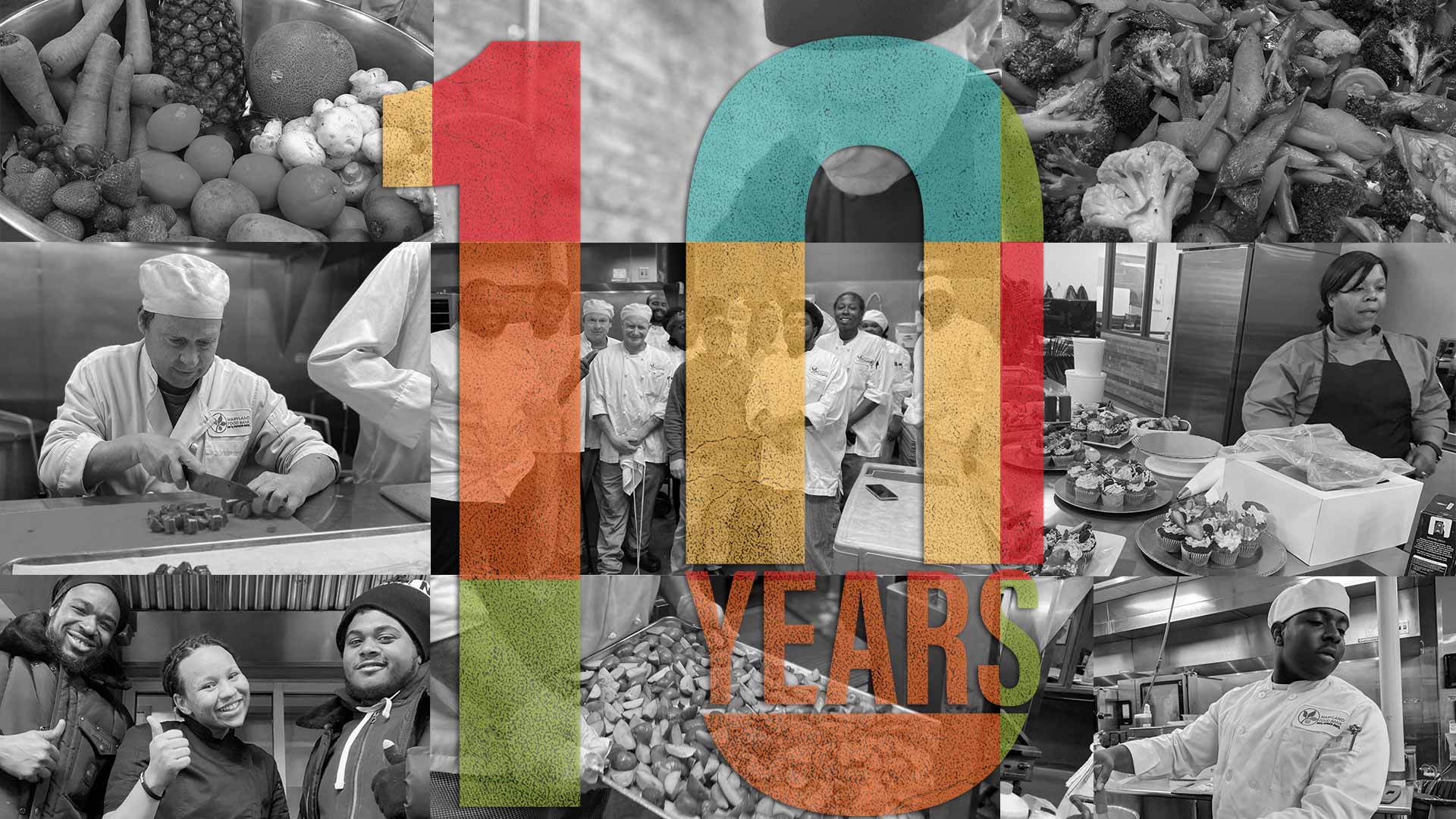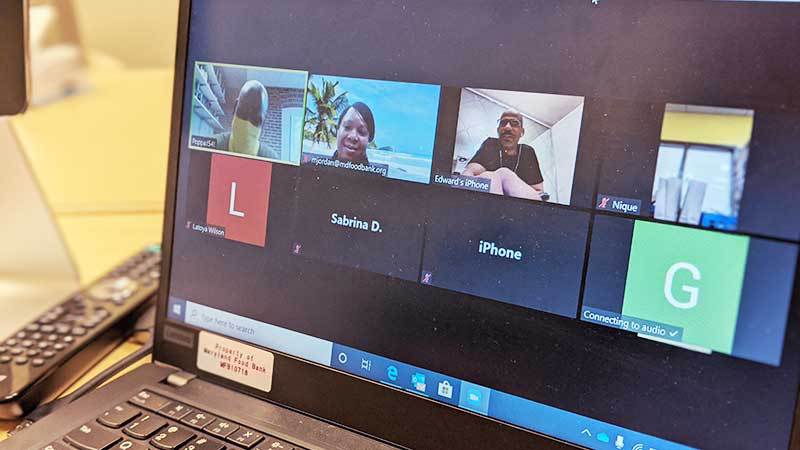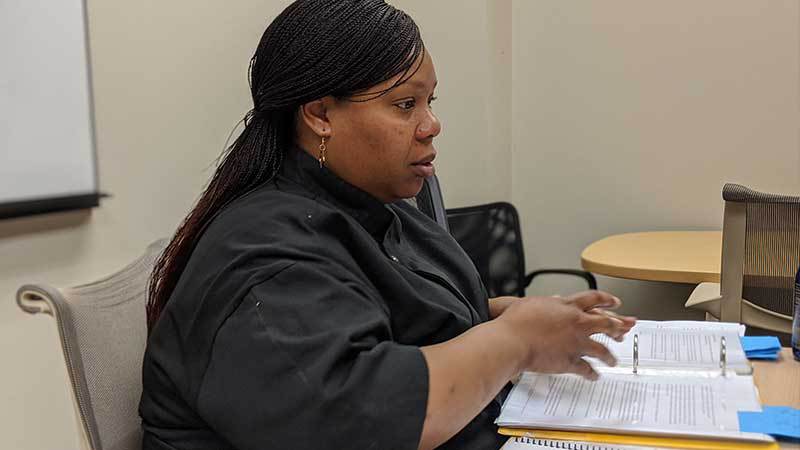FoodWorks’ Virtual Classroom in an Era of Distance Learning

Since 2010, FoodWorks has empowered individuals with a fresh start through culinary training. To commemorate the lives this program has changed and the people it has fed, the FoodWorks team had planned a year-long celebration, complete with a variety of events to mark its 10-year anniversary.
Like so many other institutions and organizations observing milestones in 2020, the COVID-19 pandemic has forced FoodWorks to shift gears and move away from celebratory plans made at the beginning of the year.
While FoodWorks may not be having the tenth anniversary it expected, it is having an anniversary year like no other: one that Maryland needs right now. Our culinary team has stepped up throughout the course of the pandemic, preparing Grab & Go meals for food-insecure children who are unable to rely on the free and reduced-priced meals they would typically receive in school.
FoodWorks is a staple program that, no matter what, will continue to feed and empower those in need.
FoodWorks’ Virtual Classroom in an Era of Distance Learning
Chef Monique “Moe” Jordan dove headfirst into her new role as Executive Chef of the Maryland Food Bank’s FoodWorks Culinary Training Program in December 2019, midway through FoodWorks Class #34.
She arrived at the food bank with more than two decades of culinary experience, innovative ideas, and an eagerness to elevate the status of FoodWorks as it journeyed into its tenth year of operations.
Although she was ready for the challenges that come with adapting to a new environment, nothing could have prepared her for COVID-19 and how the global pandemic would reshape institutional learning for the foreseeable future.
Nevertheless, she used her determination and agility to alter her typical methods of instruction.
“I’m like a chameleon,” Chef Moe shared. “I believe that any great teacher can adapt to their environment and make it happen.”

The Zoom Queen
When the COVID-19 pandemic escalated in mid-March, FoodWorks Class #35 was forced to temporarily pause. Within two weeks, however, Chef Moe and her team managed to continue instruction during the program’s hiatus.
“I wanted to make sure the learning still continued,” said Chef Moe.
Eventually she settled on modifying lessons and FoodWorks very quickly transitioned to online instruction through the application, Zoom.
“I have been teaching for 20+ years,” said Chef Moe. “But this is the first time I’ve ever had the opportunity to teach through online Zoom classes.”
The now self-proclaimed “Zoom Queen” confronts challenges with confidence, not fear. She quickly adjusted her curriculum and sent study materials to her students, allowing them to complete the second module online. As of mid-May, Students are transitioning into the third and final module of the program.
“Chef Moe has been sending us papers to print out with information on spices, vegetables, fruits and so much more,” said FoodWorks Student Sabrina Diggs. “These resources have been excellent in helping us learn everything we need to know for the tests.”
Chef Moe makes use of the two hours of class time three days a week to teach and review material this material, all the while keeping spirits up and encouraging students to stay motivated.

Hungry to Learn
I don’t look at my students as clients. I look at them more like family members” said Chef Moe. “After we closed, I had to check in on them, make sure they were okay, and see if they needed anything.”
After conducting wellness checks, Chef Moe wasn’t sure how her students would stay connected and engaged despite varying levels of access to technology. But this proved not be as much of an issue after all, as students without access to Zoom have had success in calling into class meetings through landline phones. A few students even believe online classes, in some instances, have been more convenient than classes in person.
The student’s dedication to learning and to themselves trumps any technical issues that may arise. According to Chef Moe, the students are “hungry to learn” no matter the situation.
“I actually kind of prefer online classes. They have been awesome so far. It’s given me extra time to go over the book and ask questions.”
“Classes were good before, but I think this style (online) is better sometimes because we can ask questions without worrying about if other people are in a rush. We can take notes without disruption and Chef Moe helps us with very specific questions when going over stuff for our tests.”
Returning to the Kitchen
Although she has had major successes in teaching her students through Zoom, Chef Moe eagerly awaits the day she can resume face-to-face instruction. Face masks and social distancing will change the culture of the classroom, but these measures and others will be necessary to ensure everyone’s safety.
While online classes serve their purpose, they could never replace in-person classes.
“Being physically in the kitchen, seeing how things should be stored, and watching techniques like knife skills first-hand is very important,” said Sabrina. “You might not get a full understanding of some of the important concepts unless you’re actually there.”
When the students return, they are expected to take and pass two exams which will then qualify them to receive their ServSafe Manager’s certification. Receiving this certification is a major accomplishment for students, and many are confident that continued instruction is adequately preparing them to pass these tests.
“Trust me, Chef Moe won’t let any of us fail,” said Helen Ayomobi.

The Future of FoodWorks
“I want to be able to revamp and elevate FoodWorks to where we’re running like a Lincoln Tech or a Stratford University,” said Chef More. “We want to compete with some of these other culinary programs.”
Chef Moe’s ambitious attitude and belief in this program has motivated her to explore expanding the range of certifications FoodWorks offers in the future. The Customer’s Service certification, for instance, offers the skill of not only how to deal with customers, but how to deal with classmates and other professionals in the food service industry.
“I’m excited about the future of the FoodWorks program,” said Chef Moe. “There are some great things happening on this side of the food bank and I can’t wait to share them with everybody.”
The graduation for FoodWorks Class #35 Is tentatively scheduled for June 26. For additional updates and information regarding this program, visit our FoodWorks webpage.
We Need Your Help
Programs, campaigns, and workforce development at the Maryland Food Bank has always relied on the philanthropic support of charitable individuals like you.
Much like our food distribution efforts, workforce development programs like FoodWorks at the Maryland Food Bank rely on generous donations of money and time.






